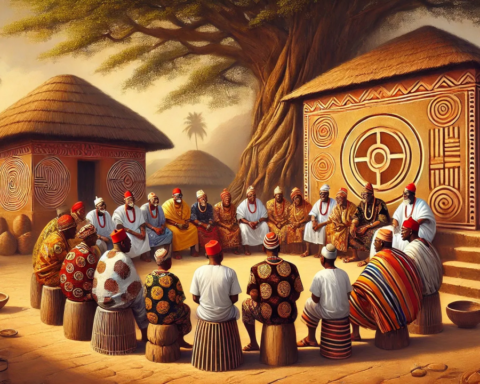From IKECHUKWU NNADI, Nsukka
Okpatu community in Udi Local Government Area of Enugu State may well be living in a world of its own, as this is probably the only community in Nigeria where marriages are permitted to take place only within one half (six months) of the year and prohibited within the other half.
For residents of the community, this means there are practically only six months in a year as far as marriage rites are concerned.
Daily Query reporter in Enugu gathered that this tradition is as old as the community itself, even as there has been stiff opposition to this seemingly archaic and anti-people tradition.
Tucked between the rainforest of Igbo-Etiti and Enugu
urban, the ancient community is said to be practising an 18th century tradition that many of its indigenes say no longer serves them well. Needless to say that they mounted stiff opposition to it, even if they haven’t succeeded in bringing an end to the archaic traditional practice.
According to Daily Query investigation, these six months within which marriage is prohibited in the community are the months of Odo Deity and its masquerade festival, which usually starts from March through August every year.
According to a resident of the community, Mr. Ifeanyi Nwonu, during these months, no single marriage ceremony takes place in the town.
“The consequences of disobedience to this tradition are better imagined than experienced,” Nwonu told Daily Query
Residents react to the tradition
However, investigation also revealed that with growing Christianity in the community and beyond, there has been very stiff opposition to the tradition.
Another resident of the community who identified himself as Philip Eze, told Daily Query that though the tradition is as old as the community itself, it will soon whittle down owing to westernization.
“I grew up to discover that one can only carry out marriage rites within six months in a year in our community,” Eze, a father of three children, narrated.
“When I wanted to get married in 2015, my parents told me that I cannot do any marriage rites as the window period had then elapsed. I had to wait for the next few months before I could start the process. It is an
age-long tradition which is as old as our community itself.”
Asked what would be the likely consequences of disobeying the tradition, he recalled: “Some years ago, when I was young, we heard that somebody disobeyed the tradition and went ahead to hold his marriage
rites in the community during the forbidden time. A few days after the marriage, the couple died mysteriously.
“They went to bed and couldn’t wake up again in the morning. Since then, nobody dares to disobey the tradition in this regard.”
Opposition against the tradition
However, according to our findings, some years ago, some members of the town’s Christian community opposed the tradition, calling it idolatry.
It was gathered that some Christians who felt alienated by the tradition gathered themselves to oppose the tradition and at the same time encourage other people not to obey “the devilish tradition.”
Explaining the development to Daily Query, one of the community leaders who did not want to be quoted, explained that “some people whom we can call Christian extremists, came together to oppose the tradition some years ago. Actually, they didn’t find it funny. It was a moment of turmoil and mini-religious
war in our community. But to the glory of God, we survived it.”
The Odo Masquerade festivities
According to our findings, the name Odo, as some scholars have said, implies peace. Odo is a common phenomenon among virtually all the communities in old Odo-ozo Local Government and its environs.
Our source revealed that like every other community in South East Nigeria, before the advent of Christianity to Igboland, African traditional religion was the only type of religion practiced by Okpatu people.
For this reason, Odo and its rituals were seen as means of communication between the living and the dead that lived right while on earth. The Odo masquerade was used immensely in the enforcement and maintenance of law and order in the community.
The cult was also used as a social protector for
communities that have been oppressed. Though this practice has been on the wane since the advent of Christianity in most Igbo communities, in Okpatu, they still hold tight to some rituals associated with the Odo, especially prohibiting any form of marriage rites
during the six-month period of its outing.
In recent times, there have been moves by some youths in Okpatu to make Odo less shrouded in secrecy by infusing it with much of the entertainment angle that has become its Masquerade festival’s current status as a tourist attraction.
Accordingly, the periods of its outing and return to the land of the spirits have been designed to enable members of the community to plan their activities around those periods.
“There are three calendar times in the Odo masquerade season which include the return of Odo from the land of the spirits and this takes place within two months. After that, then comes the sojourn of Odo among the living and
this lasts for 6-7 months during which no marriage rites are held in the community.
“After the seven-month period, then comes the return of Odo to the land of the spirits and this also occurs within 2 months.
“Though these complex activities are not clear-cut, one gradually and naturally flows into the other. They are so planned to fit in with the traditional native calendar (thirteen lunar months),” another community leader told Daily Query.
All efforts to speak with the traditional ruler of the community proved abortive as he was said to have travelled to Enugu, the state capital, for an official meeting
with the Commissioner for Local Government and Chieftaincy Affairs, when our reporter called.
Onyishi, the oldest man in the community, could also not be reached for comment as he was not in enough stable health condition to speak with our reporter when he visited his house.


























